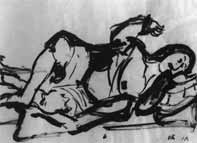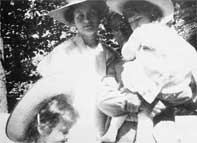|
Alma - a monster of the 20th century
Paulus Manker
Alma struggled till the end, and very heroic, too. But she
failed, she had to fail probably out of the reasons you have
mentioned. Was that the reason that transformed her into a
monster? Because once you said, I remember: "To understand
the history of our century, the best is to go through the
monsters". Maybe she does belong to the monsters? Because
what she later did, mainly in the last years, she tried to
lie, and to perfume, and make up her life for the posterity.
It does not give a very pleasant image of that woman.
Joshua Sobol
I don´t think Alma was a pleasant person. She was one
of the monsters of our time. But to understand the history
of our century, the best is to go through the monsters. She
was a monster in the sense that everything with her is bigger,
bigger than life. And she made herself bigger than life. And
when she writes about herself in her autobiography you feel
that she is possessed by that need to prove that every moment
of her life was not ordinary, it was extra-ordinary. Nothing
was mediocre, everything was superb. She has that style of
exaggerating about everything, which is again not the style
of our time. I think that if you take the revolution of the
Beatles and the Rock-revolution, which changed the attitude
towards poetry, towards language, and we are now looking for
simplicity in language and in images, and using everyday language
and everyday images in order to describe our feelings, she
still belongs to that older generation, where you could not
speak about feelings without using enormous words, using superlatives.
Everything must be extraordinary, grandious, exciting, schizophrenic,
I don´t know what. In that sense she was one of those
monsters of the begining of the century.
Also by the choice that she made of her male partners. I
suspect that she was picking them up according to their talent,
to their I.Q. almost or whatever other parameter she was using.
She was picking them up according to their potential, their
spiritual potential, and they promised to become the artists
who are going to express the spirit of our time. And that´s
why I put the emphasis on her pushing and manipulating Werfel
to become greater than Thomas Mann, she is pushing Kokoschka
to produce a masterpiece. Mahler she didn´t have to
push, because he was pushing himself hard enough. But I think
that´s what she liked in him or this is what attracted
her in this person, that he had this enormous engine pushing
him to achieve.
 |
 |
 |

left: Oskar Kokoschka: "Sketch
for Woman in Blue" (1919)
right: Alma with Gustav Mahler and their daughters Maria
and Anna in
Maiernigg (1905) |
So, in that sense to the size of her ambition, the pretence
to be there when these people are taking off, and going into
the sky like shooting stars, all that makes of her an expression
of the spirit of our century, where ambition has no limits,
where personal ambition, the wish to express the dimensions
of one´s personality without any limits, without respect
to any limits or values or anything, it is just that kind
of almost human megalomania. And I think Alma was a megalomaniac.
< Genesis
of the play
> No creative
energy without sexual energy
|
